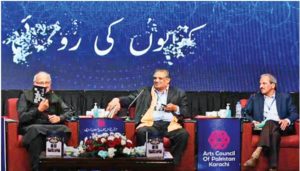Pakistan a hard country for independent journalism
Writings and columns of journalist Mazhar Abbas helps the readers understand the complexities of Pakistani politics.
Abbas’s colleague and senior journalist Suhail Warraich made this observation as he spoke at the launch of Abbas’s book ‘Aur Phir Yun Hua’ on the third day of the International Urdu Conference under way at the Arts Council of Pakistan.
The session was moderated by Anjum Rizvi in which Warraich and Abbas talked about the book, which is a compilation of Abbas’ columns and analyses.
Warraich said that in today’s age where we do not have influential mediums of literary magazines and radio channels, columns are the main source of offering political messages and commentaries.
“Journalism is the first and rough draft of history and literature embodies the conscience of the era,” he said. “Similarly, today’s columns help identify sensibilities and genuine pictures of the contemporary era.”
Citing a column of Abbas about a conversation with a general, Warraich said that particular piece was apparently suitable for a banner-head story on the front page. “But he toned out the piece in a skilful manner that provided all the information, omitted its sensitiveness, and also managed to publish it. Otherwise, if it was a news story item that would probably not get published because of the sensitive information it had.”
The journalist said that two qualities distinguished Abbas from the others — standing firm on his principles and avoiding to go to the extreme.
Abbas said the book offered readers informed insight on various issues, such as problems of Karachi, assassination of former prime minister Benazir Bhutto, politics of former prime minister Nawaz Sharif, dynastic politics, civil-military relationship and pre-poll political engineering.
“It is unfortunate that we did not learn lessons from history and forget the important developments of the past. We are still experiencing the same affairs that were experienced 70 years ago,” he said.
“Most anchors and columnists in the country still criticize democracy but I have to tell them that they can only write such columns in dictatorships against the democratic governments, not against dictator rulers,” he remarked.
Citing one of his columns on the Muttahida Qaumi Movement (MQM), Abbas said that he had realized after the speech of Altaf Hussain on August 16, 2016, that the return of the political party was impossible then.
“Political parties still operate but today neither is the MQM in its original shape nor are the Pakistan Peoples Party and Pakistan Muslim League-Nawaz in their older positions,” he said.
He added that Pakistan was a hard country for independent journalism where around 125 journalists had lost their lives while performing their duties. “We have also seen a great difference in the work of journalists before they disappeared and after they returned.”
Abbas said that he had written his pieces and analyses mainly on the basis of his field reporting. “In Karachi, I have covered ethnic and sectarian riots where hundreds of people were killed in a single day,” he said.
He remarked that he did not see the return of Nawaz Sharif in the country’s practical politics. “But the credit also goes to the PML-N that the party’s vote bank is still intact.”
Abbas said the Tehreek-e-Labbaik Pakistan had spoiled the votes of the MQM in Karachi and the PML-N in Punjab and there was a need for a careful analysis of the factors behind the TLP’s emergence.
Discussing the challenges the media faces, Abbas said the establishment had realized in 2007 that the media and judiciary were becoming more independent and at that time, policies were made to control them and curb their freedoms.
Source: The News

